POETS, New NSF Center at Illinois, Poised to Revolutionize Electro-Thermal Systems
October 19, 2015
"The new Center...uniting expertise across disciplines, will focus research on what truly is possible and achievable rather than working within the limitations of what currently exists. And what better place to do it than the University of Illinois?” University of Illinois President Timothy Kileen
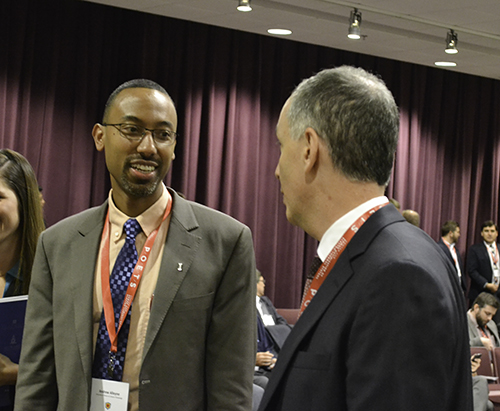
POETS PI Andrew Alleyne (left) greets Illinois Vice Chancellor for Research, Peter Schiffer prior to the Kickoff Event
Marking the official beginning of the $18.5 million, NSF-funded POETS (Power Optimization for Electro-Thermal Systems) Engineering Research Center, National Science Foundation (NSF) and University leaders, POETS collaborators, and interested members of the University community attended the October 15, 2015 “Kickoff Event.” Headed up by PI Andrew Alleyne, Ralph & Catherine Fisher Professor in Mechanical Science and Engineering, the Center’s goal is to improve the power density of next generation electro-thermal systems.
The Center hopes to develop innovations providing “more power in less space” which have the potential to impact our everyday lives, ranging from faster, smaller, and lighter mobile electronics to significant economic and environmental impacts, such as limiting the fuel needed to operate cars, off-highway vehicles, and air-craft.
Led by the University of Illinois at Urbana-Champaign, POETS includes other domestic academic institutions, the University of Arkansas, Howard University, and Stanford University, plus international partners University of São Paulo at São Carlos School of Engineering and the KTH School of Engineering Sciences.
Some of the Center’s numerous industry partners include off-highway vehicle manufacturers Caterpillar and John Deere; automobile manufacturers, such as Ford, GM, and Toyota; manufacturers of electronics and devices, such as Texas Instruments and On Semiconductors; United Technologies, which provides high-tech systems and solutions for the aerospace and commercial building industries; Johnson Controls, which strives to optimize energy and operational efficiencies of buildings and automotive batteries; Halliburton, which provides products and services to the energy industry; and C-U Aerospace, a local, small to medium enterprise.
POET’s kickoff event included addresses by University of Illinois President, Timothy Killeen; the NSF’s Director, France Cordova, and Dr. Pramod Khargonekar, NSF Assistant Director for Engineering; lawmakers, including Illinois Congressman John Shimkus; and, of course, PI and Center Director Andrew Alleyne. Also attending the event were a number of industry partner representatives.
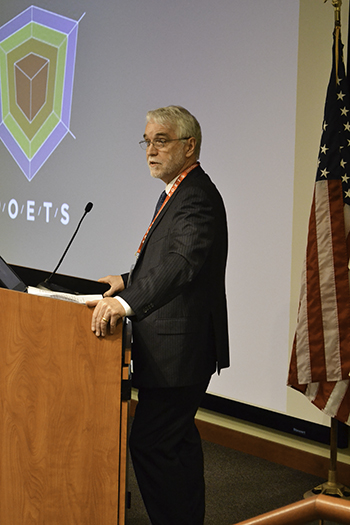
University of Illinois President Timothy Kileen addresses the audience at the POETS Kickoff Event
injecting a bit of humor into his remarks, University of Illinois President Timothy Killeen underscores the importance of the Center:
“I hope you’ll forgive me for breaking out in technical terms, but this new engineering research center is what we at NSF like to call a “really big deal,” quips Killeen.
He stresses from personal experience at NSF the ERC program’s competitive nature: “These are very difficult grants to get—incredibly competitive. Best ideas across the country competing.”
He then outlines the Center’s importance to Illinois stakeholders: “It’s a big deal for our faculty, and it’s a big deal for our students, putting them on the very leading edge of research, education, and discovery in an arena that is so critically important for societal prosperity in the future.”
Killeen also explains societal impacts POETS could have: “It’s clearly a big deal for our state and our nation, promising next-generation power sources that would not only serve society’s need but also create new products, and, yes, new industry to drive economic growth. We like to be at the beginning of major things here in Illinois.”
Mentioning a few Illinois contributions which helped to usher in the digital electronic age, “An era that, I’m proud to say, was fueled, in part, through innovations rooted in this campus,” Killeen boasts, “including such things as plasma screens and the first graphical web browser,” he also mentions the increasing demands ushered in by this new era:
“People want more power…for their laptops and global electronics, and the world needs more high-power density in smaller packages. And they want the same extra, light-weight zip in their hybrid electric cars, their hand-held tools, and other modern conveniences that continue to evolve through new rapidly changing technology.”
To address the new technology needs, one of POETS’ key emphases is a systems approach via a structure designed to foster interdisciplinary collaboration (see the POETS model to the right). The intent is to counteract the silo mentality, an attitude in which disciplines or departments do not want to share information or knowledge with individuals from other disciplines.
Several speakers, including Killeen, alluded to the fact that POETS hopes to address this issue. In fact, Killeen attributes current electro-thermal issues the Center is seeking to address to “walls of our own making, with engineers in different disciplines working in silos on their piece of the problem rather than working together collectively to take on the collective effort.”
Kiileen asserts that “The new center will knock down those walls. It will foster the interdisciplinary collaboration” and that “uniting expertise across disciplines will focus research on what truly is possible and achievable rather than working within the limitations of what currently exists. And what better place to do it than the University of Illinois?” he claims.
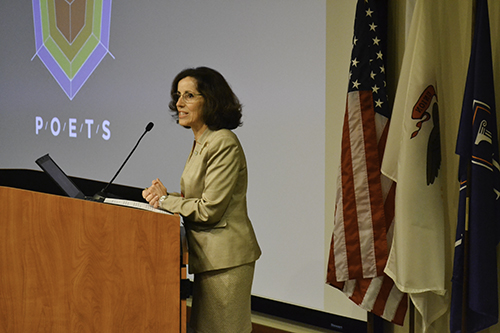
NSF Director, France Cordova
NSF’s Director, France Cordova begins by affirming the University, “I’m just so proud of what the University of Illinois is doing. It really speaks to the mission of NSF, which is both research and education, and their integration.”
Indicating that POETS, “is a great name for this Center,” and “a powerful collaboration,” Cordova then cites NSF’s goals for ERC:
“Engineering Research Centers integrate engineering research and education with technological innovation to transform our economy, health, and security. They make scientific discoveries and technological innovations, and support engineering graduates, who help develop into creative pioneers and our next generation…in emerging technological areas.”
Cordova reiterates what she believes to be one of the ERCs’ key investments: students.
“That’s what we are ultimately investing in. All of you who are students in this audience, we’re really investing in you...the leaders of tomorrow…Building these types of innovators and trail-blazers is paramount to NSF’s program, and the building-stones of a growing economy and a very strong factor in ensuring our global competitiveness. It will be our next generation of diverse students that permeate the multidisciplinary culture of the ERCs.
Cordova closes by expressing confidence that POETS will live up to its predecessors:
“The beauty of science, founded in collaborative and diverse partnerships like ERCs, is that sometimes we come across unexpected discoveries and solutions that change the world. Many years ago, a leading literary critic was asked, ‘What makes great art?’ His response was, ‘That which surprises well.’ And I would hold, the same goes for great engineering. ERCs have a wonderful record of success, and I’m confident that this ERC will continue to advance engineering research, education, and innovation and surprise us well.”
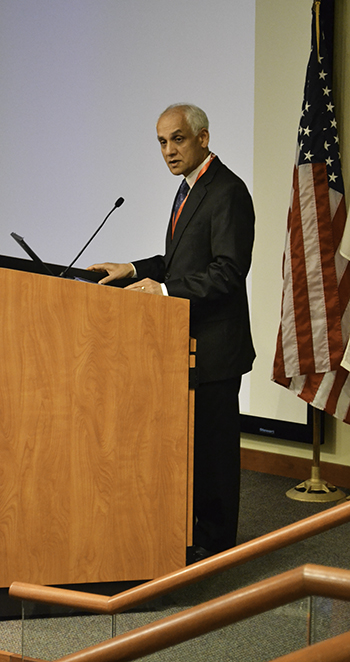
Pramod Khargonekar, NSF Assistant Director for Engineering
Pramod Khargonekar, NSF Assistant Director for Engineering, addressed several of POETS strengths, from NSF’s perspective. According to Khargonekar, “The team of experts that have come together to realize this opportunity was very, very compelling to us.”
Khargonekar also mentioned the University’s commitment to both education and diversity as being key factors in their being chosen to receive the award:
“The commitment to education and diversity engineers out of this program, and also a real commitment to diversity, a real commitment to the inclusion of students and faculty from all backgrounds and all disciplines—that was a big piece of what impressed us most.”
He indicated that the third thing, from the viewpoint of NSF investment, was, “very, very strong innovation resources.” He then went on to mention a number of industry partners.
In his closing remarks, Khargonekar affirms why NSF expects the POETS Center will achieve its goals: “We firmly believe that the institutions and industry partners have the intellectual strengths, as well as organizational strengths…as surprises happen, as you discover things, to reach the vision that was outlined in your proposal,” and that the Center will train, “fantastic students who will go on and change the world.”
In fact, POETS’ proposal to NSF specifically addresses silos in education, where “Engineering education conducted in silos limits systems-level approaches to design and operation.” Dedicated to training interdisciplinary students, POETS outlines in its proposal that it “will create the human capital that is explicitly trained to think, communicate, and innovate across the boundaries of technical disciplines.”
Affirming that industry needs these types of students, who are confident in moving beyond the borders of their own discipline—were several industry partner representatives. Bryan Lammers, a technical manager at Caterpillar and Julian Sanchez, Director of John Deere Technology Innovation Center, both from the University’s Research Park. Representing small to mid-sized business was John Carroll, President of a local business, CU Aerospace. The three participated in a panel, during which they shared the types of students they need and the types of innovations they’d like to see the Center develop.
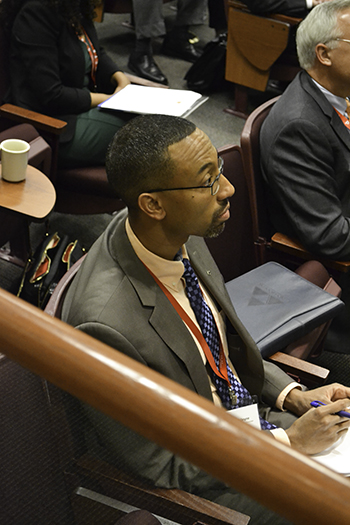
POETS PI Andrew Alleyne listens to speakers during the Kickoff Event.
Caterpillar’s Lammers shared why Illinois students are so successful: “For quite a while, [Illinois] has been producing people that will enter industry and be able to do successfully from the start; there’s not a long training period for University of Illinois grads.”
He claims that one reason for that is the university’s tendency to “provide a little theory, and make a student apply it immediately afterwards.”
While he admits that he’s recruited from other universities, he claims their students don’t compare, and that Illinois students are a step above those from other institutions:
“So person after person after person that leaves this particular university can apply all the things that they’ve learned, and they do it with their feet running when they hit the door…For some reason, U of I prepares its students exceptionally well to be able to apply all the things that they’ve been taught, and that makes it a very special university.”
Reporting that his office hires about 50–60 part-time students year-round, John Deere’s Julian Sanchez relates an anecdote about his office: “A lot of times, folks from within Deere will assume that we have a huge full-time staff down here because of the amount of work that we can take on and the quality of work that can come out of the center. And in essence, that’s all driven by the students.”
Sanchez indicates that he’s excited about POETS, “systems approach and breaking down silos,” which he claims goes beyond the interdisciplinary team to create what he terms as, “the interdisciplinary individual. That’s the kind of person that I think drives innovation and at Deere,” he adds. “Specifically, we’re looking for, the person that can expand beyond the one field and look at the world from very different perspectives.”
Author/Photographer: Elizabeth Innes, Communications Specialist, I-STEM Education Initiative
More: Funded, POETS, Science Center, 2015
For additional articles about POETS, see:
- POETS Seeks to Change the Attitudes, Shape of Students in the STEM Pipeline
- National Science Foundation Award #1449548: Engineering Research Center for Power Optimization for Electro-Thermal Systems (POETS)
- POETS website
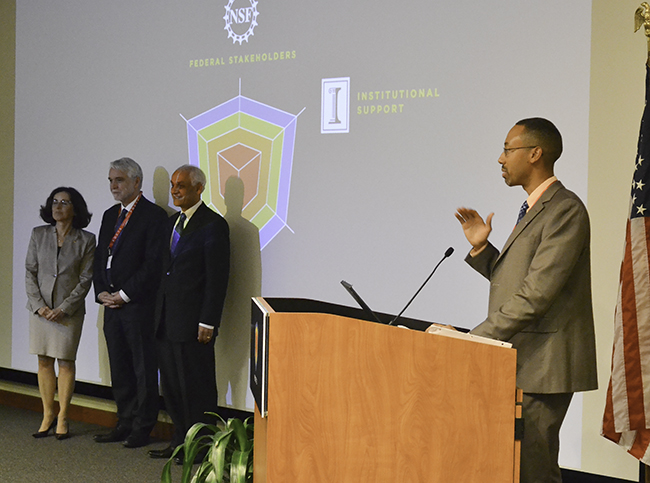
Left to right: NSF Director, France Cordova; University of Illinois President, Timothy Kileen; NSF Assistant Director for Engineering, Pramod Khargonekar; POETS PI, Andrew Alleyne during the POETS ERC Kickoff Event.
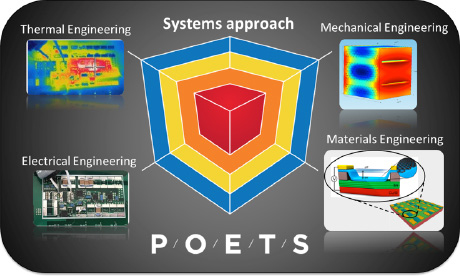













.jpg)
















